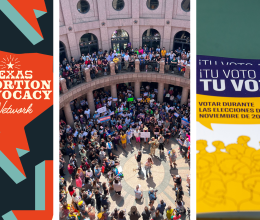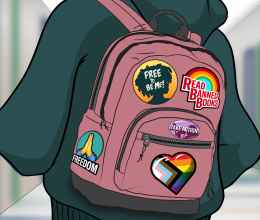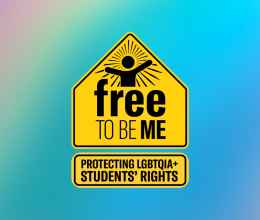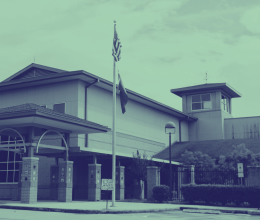
Do minors have fewer rights than adults? Take the youth rights quiz
Find out what the law says about praying in school, punishment at school for saying something on Facebook, and handling police encounters.
Take the quiz to test your knowledge. Then, as you go through the answers, find out what the ACLU of Texas is doing to educate youth about their rights.
1. A school district that allows for corporal punishment cannot discipline a student in that manner without a parent’s written consent.
a. True
b. False - If a school district agrees to allow corporal punishment, a school within that district is permitted to physically discipline a student unless that student’s parent or guardian expressly opts out in writing before the beginning of each school year.
2. School administrative staff and police officers must receive training about student mental health and suicide prevention.
a.True - Thanks to a new law in Texas, all school districts must provide for training of all teachers, administrators, counselors, nurses, social workers, law enforcement officers, and all other staff on how to recognize signs of mental health issues and intervene early and appropriately.
b. False
3. When a student is the victim of bullying, a school:
a. Must notify the parents of the bullying victim
b. Must notify the parents of the bully
c. May handle the matter internally
d. Both a. & b. - House Bill 1942, which will go into effect as law this fall, requires school officials to provide for the timely notification of both students’ parents.
4. Can the school punish a student for something he or she says on Facebook?
a. Yes
b. No
c. Maybe - Students have a First Amendment right of free speech, but it has certain limits. Schools may be able to censor or punish students for cyberspeech if it is part of a school project, uses school computers, is accessed from a school computer lab, or if it is materially disruptive, vulgar, threatening, or advocates illegal drug use. However, the Supreme Court has said that political speech is “at the core of what the First Amendment is designed to protect,” and students generally have the right to state their political opinions in a non-disruptive manner.
5. When addressing an incident of bullying that results in school disruption, a school is required to consider whether a victim was acting in self-defense when determining the appropriate punishment for those involved.
A. True - House Bill 1942 also prohibits a student from being punished if he or she was reacting in self-defense to an act of bullying.
B. False
6. Do students have the right to pray in school?
a. No, because the ACLU will file a lawsuit to stop them.
b. Yes, in most circumstances. - Students have the right to pray at school, whatever their religion or religious denomination, as long as they do not disrupt the instructional or other activities of the school. A valedictorian or salutatorian may even include a prayer or religious message in their graduation speech. The school cannot compel or sponsor student prayer, however, or set aside time for prayer during the course of any school event or activity. Prayer is an individual right, and it may not be restricted or coerced by the school or any school official.
7. Can school officials search a student’s locker without the student or parent’s consent?
a. Yes, any time they want and for any reason.
b. No, they are never permitted to search a student’s locker without that student’s consent.
c. Yes, but the search must be reasonable and related to a suspected violation of the school code or the penal law. - Under Texas law, students do not have a legitimate expectation of privacy in their lockers. The school technically owns each locker and does not need a student’s consent before conducting a search. At the same time, the search must be reasonable and related to the suspected disciplinary violation that led to the search. For example, in Shoemaker v. State, the Beaumont Court of Appeals found that when a student was suspected of stealing credit cards, a nonconsensual, warrantless search of her locker for evidence of the theft was reasonable. In contrast, in Coronado v. State, the Texas Court of Criminal Appeals held that when a student was suspected of skipping school, a search of his locker for contraband was unreasonable under the circumstances.
8. Can minors obtain contraception without the consent of a parent or guardian?
a. Yes. A student has the right to obtain any over-the-counter or prescription contraception available to adults.
b. Yes, but with some limitations. - As a general rule, minors over the age of 16 do not need consent to buy any over-the-counter form of birth control. Prescription contraception, however, normally requires the consent of a parent or guardian.
c. No. Students do not have any right to contraception without parental consent.
9. If a school administrator wants to question a student about a crime or a violation of school rules, she must first recite the student’s Miranda rights (i.e., that he has the right to remain silent, that anything he says can and will be used against him in a court of law, etc.).
a. True
b. False - Unless the police are involved in a student’s questioning or detention, a student is not “in custody” so as to trigger his or her Miranda rights. As long as the administrator is acting within the scope of his official duties in questioning the student, he is not legally obligated to “Mirandize” the student.
10. Do minors have fewer rights than adults when they are stopped by the police?
a. Yes
b. No - While school administrators have greater leeway than law enforcement to question and search students on campus, police are held to the same legal standards when stopping minors and adults. This is true whether the stop occurs on- or off-campus.
Related Issues
Related content


What Students Lose When School Becomes a Political Battleground
February 20, 2025
5 Ways Texans Made Our State Better in 2023
December 18, 2023
Students' Rights Hub
August 31, 2022Banned Book Reports
August 26, 2022
Loving Books in a Time of Increasing Censorship
September 30, 2021
Free to Be Me: A Toolkit to Protect LGBTQIA+ Students' Rights
September 16, 2021
How We Can All Help LGBTQIA+ Students Thrive
September 16, 2021